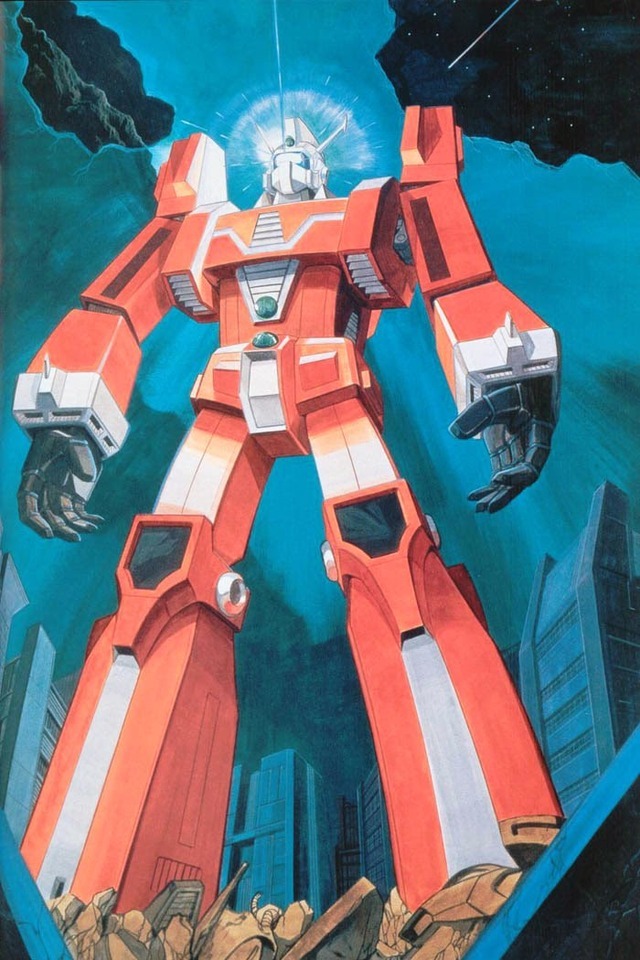

They went on a retreat to Matsumoto in Nagano and before you knew it, they had a project plan all drawn up. All the outside staff we had hired for _Aoki Uru_ were now gone, but Anno and the rest were still there. > "We had no trouble starting up another project right away. Kazuhiko Shimamoto (Gyakyoo Nine) and Hideaki Anno (Nadia) from _Animage_ magazine, September 1991 translated by Masashi Suzuki () Ann the Red Hair (!Wikipedia "Anne of Green Gables (anime)")] (1979, TV) Gundam-Char's Counterattack (1988, movie) Actually, I felt sad when I watched Nadia, which I directed, soon after watching it. I was just overwhelmed by its adult mood throughout the animation. Anno: Yes, I did, although it is a little bit light. Although some of the picture quality might be poor, please tolerate it.
#Space runaway ideon nihon review movie#
It would be best to watch the movie version's Part II (1982, movie) after watching the TV series. Tomino's animation, I would choose Legendary Giant IDEON (1980, TV). Anno: Of the movies, I recommend Gundam III - Meeting in Space. On the other hand, I feel bad when I watch shows that are made sluggishly without such soul. > Anno: Shows like Yamato or Gundam (1979, TV) which have soul, emit the staff's "cry of mind" out of the screens as a certain vibration. Hopefully this page will help remedy the problem.Įxtreme but interesting 1990 article on otaku: () there seem to be no mentions or quotations of the _Anata to Watashi no Gainax_ interviews in the Japanese web). There is so much material that half the difficulty is simply collating the existing materials, and some extensive sources seem to have been lost to both the Japanese and English fandoms (eg. the connection of Kaworu to cats, Gainax's bafflement that viewers might think Misato killed Kaji, the influence of earthquakes on people, connections to Aum Shinrikyo, garbled information about suicide attempts, Anno's conservative nationalist views or philosophy of "poison", retcons like swapping the Adam and Lilith plot devices, panspermia & First Ancestral Race being slowly removed from production materials and then post-NGE slowly restored, the many conflicting pieces of information on the end of NGE TV and _EoE_, Yamaga's questionable reliability etc).Īs I compile more material, I become increasingly convinced that far from _Evangelion_ being a baffling mystery, it is in fact one of the most understandable anime out there, with a wealth of information about almost every detail, from the earliest planning meetings to how long particular episode productions took to the source of minor details like the "A-10 nerve", and that Hideaki Anno, far from being a reticent auteur of mystery, has collectively been forthcoming about anything one might ask - to the point where multiple interviews could justly be described as "book-length" (the books in question being_June_, _Schizo_, _Prano_, the _1.0 CRC_, & the _2.0 CRC_).

The purpose of compiling a large page of quotes & references classified by date & source level is to make it easier to put NGE into a historical context by tracing the evolution of plot or characters, cross-reference statements made in interviews, jump forward and backwards to flesh out otherwise obscure allusions to events, and enable easy keyword-based search for various concepts (eg. It is usually clear which classification applies best. Carl Horn is sometimes recording Anno (primary), statements by Hiroyuki Yamaga (primary or secondary), or his own interpretations (tertiary). Some people or materials shift statuses eg. Source is based on the ultimate origins of information, not proximate an email forwarding an anonymous fan translation of a Anno interview in a Japanese book is considered primary, not tertiary. Tertiary is any source further removed than that - mainstream news coverage, academic analysis, fan speculation & analysis etc.: eg. Secondary is a source from someone who knows Primaries first-hand: eg. (I include Japanese seiyuu because as Asuka's last line shows, they have direct input, or as Ritsuko's last line shows, special insight.)Ģ. Primary is material from someone who worked on a object of interest: eg. Title: Neon Genesis Evangelion source anthologyĭescription: Anthology of Gainax/Anno/Evangelion quotes, sources, references, and analysesĭate is whenever a source was *created*, not when it was *published* or otherwise disseminated.ġ.


 0 kommentar(er)
0 kommentar(er)
